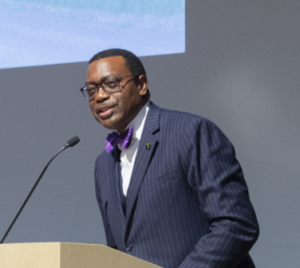The President of the African Development Bank (AfDB), Dr. Akinwumi Adesina, has charted a multi-pronged approach to Nigeria’s fiscal efficiency, particularly on the tax collection component, as a strategic step towards growing non-oil tax revenue for the country’s sustainable development.
The development finance expert listed the several fiscal measures requiring urgent adoption by the government to improve tax earnings and by implication, catalyse its current efforts aimed at pulling out the nation’s economy from the recessionary abyss it plunged into since Q3, 2020.
Adesina, in his speech delivered at the Federal Inland Revenue Service (FIRS) Tax Dialogue on at the Presidential Villa, Abuja, recalled that the COVID-19 pandemic had done so much damage to African economies such that innovative fiscal strategies will be needed to boost the countries’ revenues and fast-track the governments’ economic recovery initiatives for desired socio-economic benefits.
Noting that the AfDB in its African Economic Outlook Report had earlier projected that Nigeria’s economy is poised to recover to growth of 1.5% in 2021 and 2.9% in 2022, Adesina pointed out that building back would require a lot more resources, of which taxes form a significant part.
Specifically, he canvassed sundry fiscal imperatives for the Nigerian government to consider in its fiscal policy measures, including the expansion of the nation’s tax base expands.
According to him, given that over 60% of Nigerians are in the informal sector, priority should be to support measures to move a large part of this from informal to formal sectors.
He further canvassed: “Making tax codes simpler and reducing administrative burdens and formalities are important to move from informality to formality. Doing so will allow people to be able to better assess their tax obligations.
“Digitalization of tax collection and tax administration is critical to ensure greater transparency of the tax system, widening of the tax base, while mitigating compliance risks and encouraging voluntary tax compliance.
“The Government should focus a lot on corporate taxes, and ensure full compliance. But it is important to ensure that such taxes do not discourage investments.
“Nigeria can learn from the case of Estonia, which taxes corporate incomes, but based on distributed profits. This allows corporations to re-invest their profits in expanding their businesses. Taxing corporate revenue, instead of profits will discourage investments needed to grow businesses and create jobs.
“Natural resources tax can play a major role for Nigeria. Given Nigeria’s high reliance on oil and gas, and minerals, the government should ensure that these sectors pay taxes and royalties that are fair and transparent.
“Profit shifting, base erosion and tax avoidance by multinational corporations form a huge part of “Africa’s missing taxes”; and account for a large share of the over $60 billion illicit capital flows that Africa loses annually.
“If companies invest in Africa they should pay taxes in Africa. Governments should use Business Investment Treaties and Avoidance of Double Taxation to strengthen these incentives. If a company works in Nigeria, benefits from Nigeria, it should pay taxes in Nigeria.
“Tax policy can be used to incentivize the closing of the massive infrastructure gap that Africa faces. Nigeria is showing good example.
“The new initiative between the Federal Government and selected private sector businesses to provide road infrastructure in return for tax rebates is an excellent idea.
“It is conditional; and it can be assessed and measured for delivery. That is the kind of accountability needed, so tax rebates or exemptions are not abused.
“Today, the Dangote Group is constructing 19 key economic federal roads, stretching for 800 kilometers across the six geo-political zones, due to company tax credits from the Executive Order 007 of 2019”, Adesina added.
He, however, cautioned government against granting overly generous tax holidays and tax reliefs, adding that while there should be fiscal incentives to attract and support the private sector, governments should avoid losing too much tax earnings.
The AfDB President explained that given the size of Nigeria’s economy, the population, urbanization and consumer spending, it is a market with huge opportunities to attract investors, noting that even with the country’s infrastructure deficits, which make cost of doing business high, Nigeria is not a market that can be ignored.
In the face of the infrastructure and other noticeable gaps, Adesina advised that government’s efforts to secure investments should not be based on giving too much ‘fiscal sugar’ to the companies, so they do not suffer from ‘fiscal diabetes’ to the detriment of Nigeria’s revenue accruals
H e further advocated: “Small and medium sized enterprises should be further encouraged and supported, as they are the lifelines of earnings and the creators of jobs. Tax exemptions or tax deferments can be used to support their growth.
“Nigeria’s bubbling youth are creative. While their businesses may be small, they should be incentivized to grow. Over time, they will become bigger businesses that can provide much higher taxes. There is an urgent need for a fiscal policy regime that strongly supports businesses of young people in Nigeria.
“Given Nigeria’s high level of poverty and huge income inequality, taxes should not be regressive, where taxes paid on goods or services are the same regardless of income.
“But one thing we cannot ignore is good governance. Good governance is the “speed dial” for greater tax payments. The role of the government is not just to collect taxes; its role is to ensure that the taxes are collected transparently, used transparently and responsibly; and that citizens see what their taxes are being used for.
“While there should be tax obligations for citizens, there must also be tax accountability to citizens from governments. Participatory tax-based financing systems demand participatory governance.
“While tax rates are low in Nigeria compared to a number of African and non-African countries, that is not a justification to keep increasing taxes.
“We must also distinguish between nominal taxes and implicit taxes — Taxes that are borne but are not seen or recorded.
“We should not simply compare tax-to-GDP ratios. We must not compare apples and oranges.
“Truth be told, Nigerians pay one of the highest implicit tax rates in the world — way higher than developed countries”, Adesina added.
Noting all the burdens individual and corporate tax payers continue to cope with despite fulfilling their tax obligations to the fiscal authorities, the AfDB chief lamented that governments, over time, had simply transferred their responsibility to citizens when they fail to provide basic services.
To reverse the ugly phenomenon, he said that efforts should be made to improve overall tax administration and compliance since weaknesses in tax administration with complex tax codes cause leakages, costing governments to lose much needed resources for development.
Adesina further stressed: “Tax legislations should also be stable and predictable. Given Nigeria’s structure, with three tiers of government with varying powers, efforts should be made to harmonize tax regimes and avoid multiplicity of taxes.
“To succeed, efforts must be made to reform domestic tax laws and institutional frameworks. There is much scope to further improve the institutional capacity for tax audits, data management and business intelligence, at all levels, to improve tax revenue collection”, he added.
He assured the readiness of the AfDB to provide needed technical and institutional support to the FIRS to build up its capacity for tax administration.




